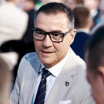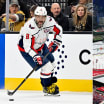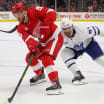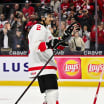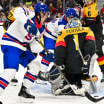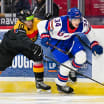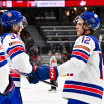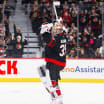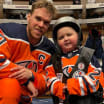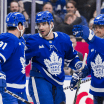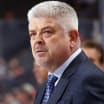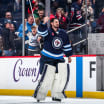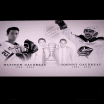As part of Hockey Fights Cancer Month, NHL.com will profile some of the people who are in the midst of their own battles with cancer. Today, Oskar Lindblom's inspirational return from Ewing's sarcoma.
Oskar Lindblom's return to the Philadelphia Flyers during the Stanley Cup Playoffs marked a milestone in his battle against bone cancer.
Lindblom's return from bone cancer becomes inspiration for Flyers, others
Impact of forward's comeback felt around NHL, throughout community
How Oskar Lindblom battled back to the ice
The 24-year-old forward was written into the lineup for Game 6 of the Eastern Conference Second Round against the New York Islanders on Sept. 3. Nine months earlier, on Dec. 10, 2019, he learned of his diagnosis of Ewing's sarcoma.
RELATED: [Hockey Fights Cancer coverage]
Lindblom credited the support of his teammates and the hockey community for helping him in his battle.
"It's been everything," he said. "They talked to me like I'm still with the team even if I'm not there. Those tough weeks, when I felt so bad and trying to think about life and they'd call me, text me, help me get more energy. It helped me through the whole process."
That support ran just as strong the other way. Like ripples in a pond, the impact of Lindblom's diagnosis, battle and recovery from cancer spread wide and left a lasting impression on teammates, coaches, medical professionals and even business owners.
Claude Giroux said his memory of learning about Lindblom's diagnosis is as vivid today as it was 10 months ago.
"I remember it like it was yesterday," the Flyers captain said. "We were in Denver in the [hotel] lobby. I was talking to (director of medical services) Jimmy McCrossin and he told me the news. I really didn't believe it. It's that kind of news that you're trying to figure out, like, really? At that time, we didn't know how serious it was or really what it was. But we knew it wasn't great news."
McCrossin addressed the team while Lindblom flew back to Philadelphia.
"It was stunned silence," McCrossin said. "Then the questions after maybe two, three minutes of silence. When people hear the word cancer and you go through the explanation with them, but they hear cancer, they don't hear that we believe we caught it in time and it's not going to be fatal. They didn't hear that. It's the 'C' word and is he going to die and how long does he have to live. Questions like that. Then, all of a sudden, things settle down and they start listening and it turns from OK this is what it is and what can we do. First there was grief and then it's what can we do."
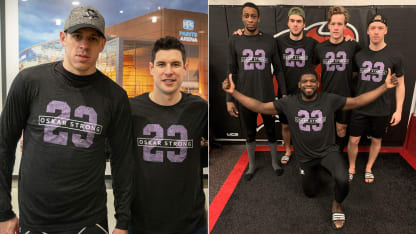
An emotionally spent group returned to Philadelphia six days later after losing all three games of its road trip, against the Colorado Avalanche, Minnesota Wild and Winnipeg Jets.
The Flyers reported to Wells Fargo Center for a morning skate ahead of a game against the Anaheim Ducks on Dec. 17 to a surprise no one expected.
There was Lindblom, greeting the teammates he left behind when he returned to Philadelphia.
The Flyers responded with a 4-1 win against the Ducks.
The occasions when Lindblom would visit for games lifted the spirits of the team regardless of what else might be going on.
"We lose or win the game, it just didn't matter," Giroux said. "Oskar was there and we were happy to have him. He's a very happy guy, he brings a lot of joy. He's always in a good mood. When you have a guy like that around you it really builds everybody up."
Motivated by Lindblom's presence and his fight, the Flyers finished with the fourth-best winning percentage in the Eastern Conference, which earned them a berth in the Eastern Conference First Round. They got another reward when the announced the 31-player roster for Stanley Cup Qualifiers in Toronto was announced.
Lindblom would be joining them.
"I knew this was great for him, to be there and enjoy the bubble with us," Giroux said. "At the stage he was at, does he even have a chance to play? He's going to have work his [tail] off to be able to play. I don't think a lot of people would have been able to get themselves back into shape."
Lindblom's availability had conditions, including the Flyers playing long enough to give him a chance to get in game shape.
But again, Lindblom's presence served as motivation for his teammates, especially when he was inserted into the lineup for the final two games of the Eastern Conference Second Round.
The Flyers lost Game 7 against the Islanders but having Lindblom on the ice with them left an indelible mark.
"Oskar being around got us closer," Giroux said. "The way we were playing, it was more playing as a team, playing for one another. It was definitely a different feeling."
\\\\\\*
Alain Vigneault's hotel room in Denver is where McCrossin told Lindblom about his cancer diagnosis that December day. The Flyers coach also had to be a calming presence for the players every day after that.
That's very different from the X's and O's that occupy coaches at this level.
"There's no playbook for this," Vigneault said.
He was able to turn to assistant coach Michel Therrien for some advice. As coach of the Montreal Canadiens in 2001-02, Therrien dealt with Saku Koivu's fight against, and recovery from, Burkitt's lymphoma.
But Vigneault said the biggest help came from Lindblom himself.
"What made the situation bearable was Oskar," he said. "He never went sideways, he never complained. That's why the situation for our whole group was the way it was. It was seeing that smile and knowing that he was going to be all right."
The Flyers opened training camp July 13, 11 days after Lindblom completed his cancer treatment with a ceremonial bell ringing at Abramson Cancer Center at Pennsylvania Hospital.
Fight. Inspire. Overcome. Celebrate.
— Philadelphia Flyers (@NHLFlyers) July 2, 2020
Ring that bell, @oskarlindblom!@PennMedicine #OskarStrong pic.twitter.com/RM1PCxHnfY
"I addressed the situation with Oskar in front of the team in our first meeting when we got back together," Vigneault said. "I remember saying to Oskar, the docs have told me you weren't going to be able to play this year. But if we make it to the conference finals, that's Sept. 6 in Edmonton, then you should be able to play because they told me you'd be all right for training camp. So we have to get to Sept. 6."
The motivation Vigneault gave to Lindblom also served as a carrot to the players -- the deeper they go in the playoffs, the better the chance Lindblom had to play.
It worked in a way, as the Flyers won their first Stanley Cup Playoff series since 2012, beating the Canadiens in six games in the first round, before losing to the Islanders in Game 7 in the second round.
\\\\
Dr. Kristy Weber, the director of the sarcoma program at Abramson, was part of the team that treated Lindblom.
"When we take care of kids or adults who have these sarcomas ... chemotherapy by itself isn't good enough, it doesn't cure people," she said. "We have to do something to the tumor where it started. With Ewing's sarcoma you can either do surgery or radiation. There were some pros and cons to which one he chose."
Few decisions made during cancer treatment are easy or unemotional. But Weber, an orthopedic oncologist who has been at Penn for 7-1/2 years, said she was struck by Lindblom's calmness in opting for surgery, and throughout his treatment.
"The thing that stuck out to me was he was so chill," she said. "By the time I met him he had been diagnosed, he had started his treatment. ... There was no drama there, no, 'I'm amazing, I'm an athlete,' no arrogance. He just wanted to get better so he could get back to the sport he loved and the people he loved. That was it. There was less drama, and you might expect there to be more drama from a high-level athlete. He was very chill, very respectful, very nice. It was a pleasure meeting him."
Dr. Lee Hartner, who as the medical oncologist oversaw Lindblom's chemotherapy treatment, also was struck by Lindblom's calmness throughout his seven months of treatments.
"What he went through was certainly one of the most difficult things we ask people to do, between all the chemotherapy, the surgery, the length of time it takes," he said. "Usually some of that first meeting, when we're giving all that information, it's very overwhelming. And that's true for everybody. What I would say is, he pretty much, I would imagine, approached it like he approaches anything else, like, 'OK, this is what I have to do and we're going to need to do and we're going to get it done.' ... I would say he had a big impact on all of us."
That impact was displayed July 2 when Lindblom rang a ceremonial bell to mark the completion of his treatment and was greeted by more than a dozen of the doctors and nurses who helped care for him, most of them wearing Oskar Strong T-shirts.
Thank you to all the doctors and nurses at @PennMedicine for your extraordinary work, care, and help in making this incredible day possible. 🧡🖤💜 #OskarStrong pic.twitter.com/JO3PmKz8JU
— Philadelphia Flyers (@NHLFlyers) July 2, 2020
Lindblom also turned his doctors into hockey fans. Weber, a St. Louis native, said the only recent hockey she's watched was when the St. Louis Blues won the Stanley Cup in 2019. But she was in front of her TV for Lindblom's return.
"I was texting people, I was calling people, he's out there on the ice," said Weber, who performed the surgery that removed Lindblom's ribs where the tumor was located and replaced them with Kevlar mesh. "I did watch him with some trepidation. It's a rough sport. I emailed him afterward and told him how proud I was of him and I told him I was a little nervous. He said he didn't even think about it. He didn't think about getting smashed into the [boards]. He was just so excited to be out there."
\\\\
Kim Parent and Jodi Smith formed Biscuit Tees, a Philadelphia sports online apparel company, in the summer of 2018.
A majority of their items are Flyers related in part because Parent is the daughter of Flyers legend Bernie Parent. But that connection also led Parent and Smith to want to do something for Lindblom in the days after his cancer diagnosis.
A shirt design was posted on the company's Instagram account Dec. 16.
"Right when we posted the picture of the shirt, that moment, everything changed," Parent said. "We didn't have a ton of followers on social media so it must have just been getting spread around. ... We immediately were getting continuous non-stop sales (orders)."
The initial goal was to raise $5,000 for Hockey Fights Cancer. They hit $50,000 in less than a week.
Players from teams around the NHL wore the shirts as a sign of support, among them Sidney Crosby of the Pittsburgh Penguins, Nicklas Backstrom of the Washington Capitals and P.K. Subban of the New Jersey Devils.
You've got this, @oskarlindblom.#OskarStrong pic.twitter.com/pIzsXq8O5f
— Pittsburgh Penguins (@penguins) January 31, 2020
Carl Hagelin and Nicklas Backstrom wearing #OskarStrong shirts tonight to support their fellow Swede Oskar Lindblom pic.twitter.com/fMCvRDg12r
— Adam Kimelman (@NHLAdamK) January 8, 2020
"We thought it was so beautiful," Parent said. "Just bringing the whole League together, as opposed to rivalries and all that. All that melted away for that amount of time."
Sales of the Oskar Strong shirts has raised more than $200,000 for Hockey Fights Cancer. Since its inception, Biscuit Tees has donated 10 percent of sales of all items to various charities, but Parent said the company will be working now in a larger way with Hockey Fights Cancer as another tribute to Lindblom.
"Just the fact that so many people are affected by [cancer] and it's something that's not just local, it's something nationwide that we can help and focus all of our charity money to that," Parent said. "That's definitely a shift that we took in our company after all the Oskar stuff happened. And it was mostly because of Oskar and the people reaching out that are affected by cancer on a daily basis."
Bigger than the game. 💜#OskarStrong pic.twitter.com/BoRzzEbTcl
— New York Rangers (@NYRangers) December 23, 2019
